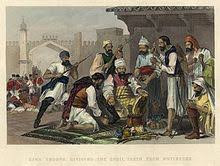The aftermath of the 1857 War of Independence, also known as the Indian Rebellion of 1857 or the Sepoy Mutiny, had profound effects on the world, particularly in British India and its imperial reach. This conflict was not only a pivotal moment in India's history but also had reverberations across the globe, shaping colonial policies, military strategies, and socio-political landscapes.
##Causes of the 1857 War:
1. **Military Grievances:** The use of Enfield rifles greased with animal fat, which offended both Hindu and Muslim sepoys, sparked resentment and led to the outbreak of the rebellion.
2. **Economic Exploitation:** The British East India Company's policies, including high taxes and land reforms, led to economic hardships and discontent among the Indian population.
3. **Cultural and Religious Factors:** The imposition of Western cultural norms, religious interference, and disrespect for Indian customs fueled cultural tensions.
4. **Political Discontent:** The annexation of princely states, diminishing power of local rulers, and lack of representation in decision-making processes fueled political dissatisfaction.
##Survival and Rehabilitation After the War:
1. **Repression and Control:** The British swiftly suppressed the rebellion through military force, executing rebels and imposing strict control over Indian territories.
2. **Reforms and Policies:** The British Crown took over direct governance of India from the East India Company, implementing reforms such as the Indian Councils Act of 1861 and the Queen's Proclamation of 1858, which promised religious tolerance and more inclusive governance.
3. **Infrastructure Development:** The British invested in infrastructure projects such as railways, telegraphs, and irrigation systems, aiming to modernize India and strengthen imperial control.
4. **Social Changes:** The aftermath saw social changes like the abolition of sati (widow burning), legal reforms, and the spread of Western education, which had long-term impacts on Indian society.
##After Effects of the War:
1. **End of Company Rule:** The rebellion marked the end of the East India Company's rule and led to direct British control over India under the British Raj.
2. **Shift in Colonial Policies:** The British government implemented policies to avoid cultural and religious insensitivity, leading to a more nuanced approach to governance in the empire.
3. **Nationalist Movements:** The rebellion inspired nationalist movements and paved the way for India's independence struggle, with leaders like Mahatma Gandhi drawing inspiration from the spirit of resistance seen in 1857.
4. **Global Implications:** The war influenced colonial policies worldwide, highlighting the complexities of imperial governance and the challenges of managing diverse populations under foreign rule.
In Summary, the aftermath of the 1857 War of Independence was marked by British consolidation of power, reforms aimed at reconciliation, social changes, and long-term impacts on colonial policies and nationalist movements, shaping the trajectory of India's history and global colonial dynamics.







Well written
ReplyDeleteSo informative
ReplyDelete